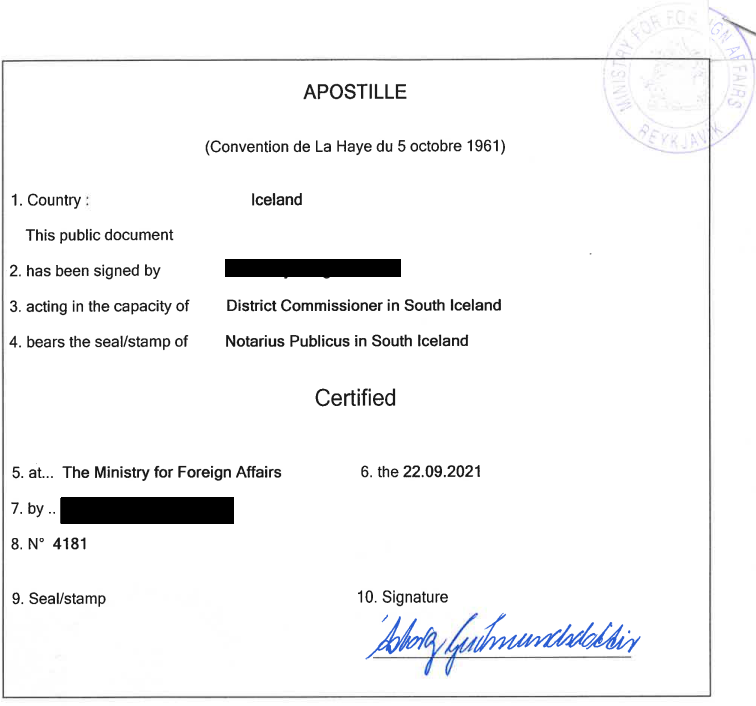
Schmidt & Schmidt covers the full spectrum of legalization services for documents issued in Iceland.
Iceland joined the Hague Convention on the Simplified Authentication of Documents on 28 September 2004; the Convention entered into force on 27 November 2004.
The apostille, or the “Hague apostille” is a certificate that authenticates the origin of a public document (e.g., a birth, marriage or death certificate, a judgment, an extract of a register or a notarial attestation). It confirms the authenticity of the signature and the authority of an official who signed the public document.
Documents issued in Iceland are certified with an apostille in accordance with the Hague Convention of 1961 are recognized in all Member States of the Hague Convention and do not require any other form of certification, such as consular legalization, which considerably reduces the costs and time required for the certification of documents. So far, more than 120 states have joined the Convention.
The apostille is not sufficient for use in the states that are not party to the Hague Convention. In this case, consular legalization applies to a public document.
Designated Competent Apostille Authorities in Iceland
In Iceland, the Ministry of Foreign Affairs is responsible for the apostille issuance process. The Ministry comprises skilled professionals with legal expertise and qualifications who handle the authentication of documents issued by Icelandic authorities. To authenticate a document, an Apostille certificate is attached to it, or, in the case of chain authentication, the Ministry's stamp is applied. The specific procedure may differ depending on whether you possess an Icelandic kennitala (national identification number) or not, with the number of steps varying accordingly.
It's important to note that the Ministry for Foreign Affairs does not provide legalization services for documents issued outside of Iceland.
The apostille in Iceland is a square stamp in Icelandic with the obligatory heading "Apostille" and a reference to the 1961 Hague Convention in French (Convention de La Haye du 5 octobre 1961). The apostille certificate’s sides will be at least 9 centimeters long.
Types of documents

| Can be apostillized | Cannot be apostillized |
|---|---|
|
|
Specific aspects and document requirements for the apostille in Iceland
To obtain an Apostille certification, you are required to present the original document to the appropriate authority responsible for such certification in the country where the document was issued. When submitting foreign documents for registration at Registers Iceland, it is generally necessary for them to be legally confirmed (either legalized or authenticated). Original copies of the documents are required. If the documents are not in English or a Nordic language, a certified translation must be provided.
If you have an Icelandic kennitala (national identification number), you can conveniently submit your request online through Ísland.is. For those without an Icelandic kennitala, the request form for authentication can be filled out at the front desk of the Ministry for Foreign Affairs or sent to them via email.
The request should generally include the following information:
- Contact details of the applicant, including name, phone number, and email address.
- The country where the documents will be used.
- The number of documents requiring authentication. Payment must be made in advance for the service.
The apostille is issued in a uniform format. In Iceland, it has the form of a printed sticker with a handwritten signature of an official, an official seal, and a hologram.
In cases where apostilles are not recognized, holders of foreign documents will need to legalize them instead. However, If the country of destination of the document recognizes and issues apostilles, then legalization is unnecessary.
Legalization of Icelandic educational documents for use abroad
In Iceland, additional authentication is typically required for educational documents, including school reports, university degree certificates, transcripts of records, enrollment certificates, and other certificates from schools or universities. For certain purposes, such as applying for a Master's or PhD degree program, an apostille for your foreign degree may be necessary.
The Ministry of Foreign Affairs in Iceland is responsible for legalizing educational documents and also offers chain authentication when apostille certification is not available. Chain authentication, also known as double verification, is used in countries where apostille certification is not applicable.
This process of chain authentification involves obtaining two stamps to ensure the document is legally authenticated. The first stamp is obtained from the country that issued the document, and the second stamp is obtained from the Icelandic Embassy in that country. To initiate this authentication process, the original document must be submitted to the Ministry of Foreign Affairs in the issuing country. The Ministry will affix its stamp to confirm the document's authenticity and then forward it to the Icelandic Embassy in that country. The Embassy will then validate the previous stamp with its own stamp.
Therefore, to obtain legalization in Iceland, the document must undergo two rounds of stamping: one from the country of origin and another from the Icelandic embassy in that country. To facilitate this process, the original document should be sent to the Foreign Ministry of the issuing country. After the Ministry's stamp is obtained, the document will be forwarded to the Icelandic embassy in that country for the final stamp of confirmation.
Recognition of the authenticity of public documents within the EU
Regulation on public documents (EU) 2016/1191 of 6 July 2016
A regulation (EU) 2016/1191 of 6 July 2016 on public documents simplifies the circulation of certain public documents that must be presented in an EU Member State and have been issued in another EU Member State, thus exempting public documents from the confirmation of authenticity with the Apostille with the aim of reducing administrative burden and costs for citizens.
Consular legalization of Icelandic documents for use abroad
Consular legalization is the process of authenticating or certifying a legal document so a foreign country's legal system will recognize it as with full legal effect that is carried out by the diplomatic or consular mission of the country in which the document is to be used.
Consular legalization is more complex, time-consuming and costly than the simpler apostille procedure. Whereas apostille is usually issued within one step, consular legalization requires several pre-certifications before a public document can be certified at the embassy or consulate of the destination country in Iceland.
It is a common requirement that the document has to be translated into the official language of the destination country before submission to the embassy. It is up to the diplomatic mission to decide about the authentication procedure.
The main differences between an apostille and consular legalization of documents
The common feature between apostille and consular legalization is that they authenticate an official document for presentation to institutions in another country. However, they have many differences.
| Apostille | Consular legalization | |
|---|---|---|
| Legal effect | Can be used in all countries that are party to the Hague Convention on the Simplified Legalization of Documents. | Use between States one or both of which is not a member of the Hague Convention, or where one of the contracting States has protested the accession of the other. |
| Difficulty | Moderate. To obtain an apostille, contact the competent apostille authority of the state of origin of the document. | High. For consular legalization, various inland authorities and a diplomatic mission of the state of destination must be involved. |
| Pre-certification | Usually not required. | Is obligatory. |
| Attestation at the state of destination embassy in the state of origin of the document | No need to contact the Consulate of the country of destination. | Is the final step of legalization. |
Apostille and consular legalization in all cities of Iceland
Schmidt & Schmidt provides apostille and consular legalization services for public documents originating from all regions across Iceland. We handle the entire process, from document review to obtaining the necessary certifications, ensuring that your documents are valid and recognized internationally. With our reliable services, you can confidently use your Icelandic public documents abroad.
Procurement of documents from Iceland
If the important documents are lost or damaged, or current copies of the documents are needed, the re-issue of the documents is required. It is not unusual for people outside Iceland to encounter difficulties with obtaining new documents when abroad. Our consultants will help you procure new documents from Iceland remotely, and we can arrange for your documents to be sent by courier anywhere in the world.
Certified translation of documents from Iceland
Copies and transcripts of civil status documents can be translated into any language by a sworn translator in Iceland or the translation can be done in the country of destination. We offer certified translations of civil status documents with further certification. The cost of the work is calculated according to the volume of the document in question.
Does the translation have to be apostillized?
Any foreign document issued in one country and used in another country must be legalized for use abroad. Therefore, the authenticity of a certified translation from Iceland needs to be certified by an apostille. Consequently, many authorities may not accept certified translations from Iceland if the translation has not been properly authenticated in Iceland for use abroad. To avoid this confusion, translations should better be made in the state of the destination of the document.

























































